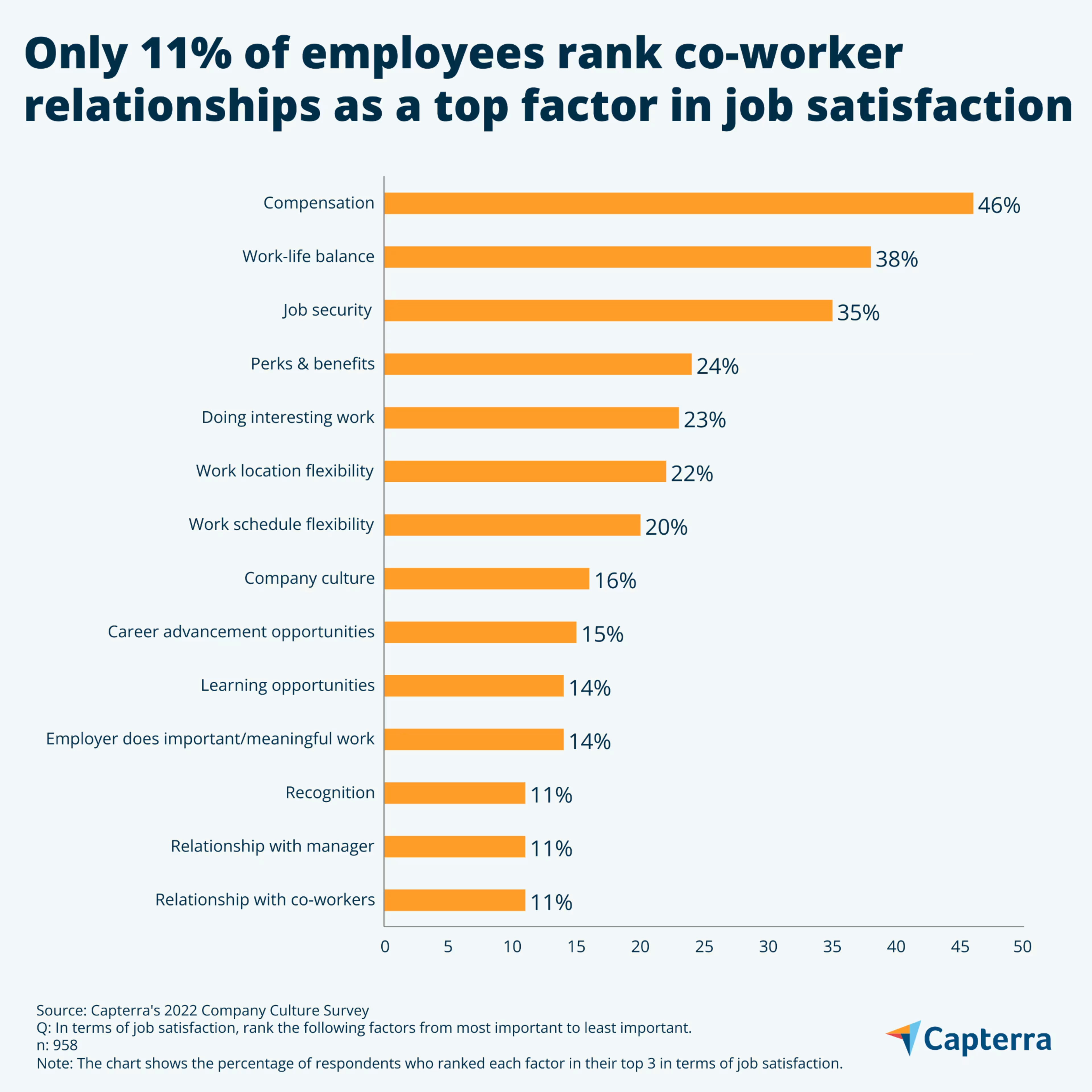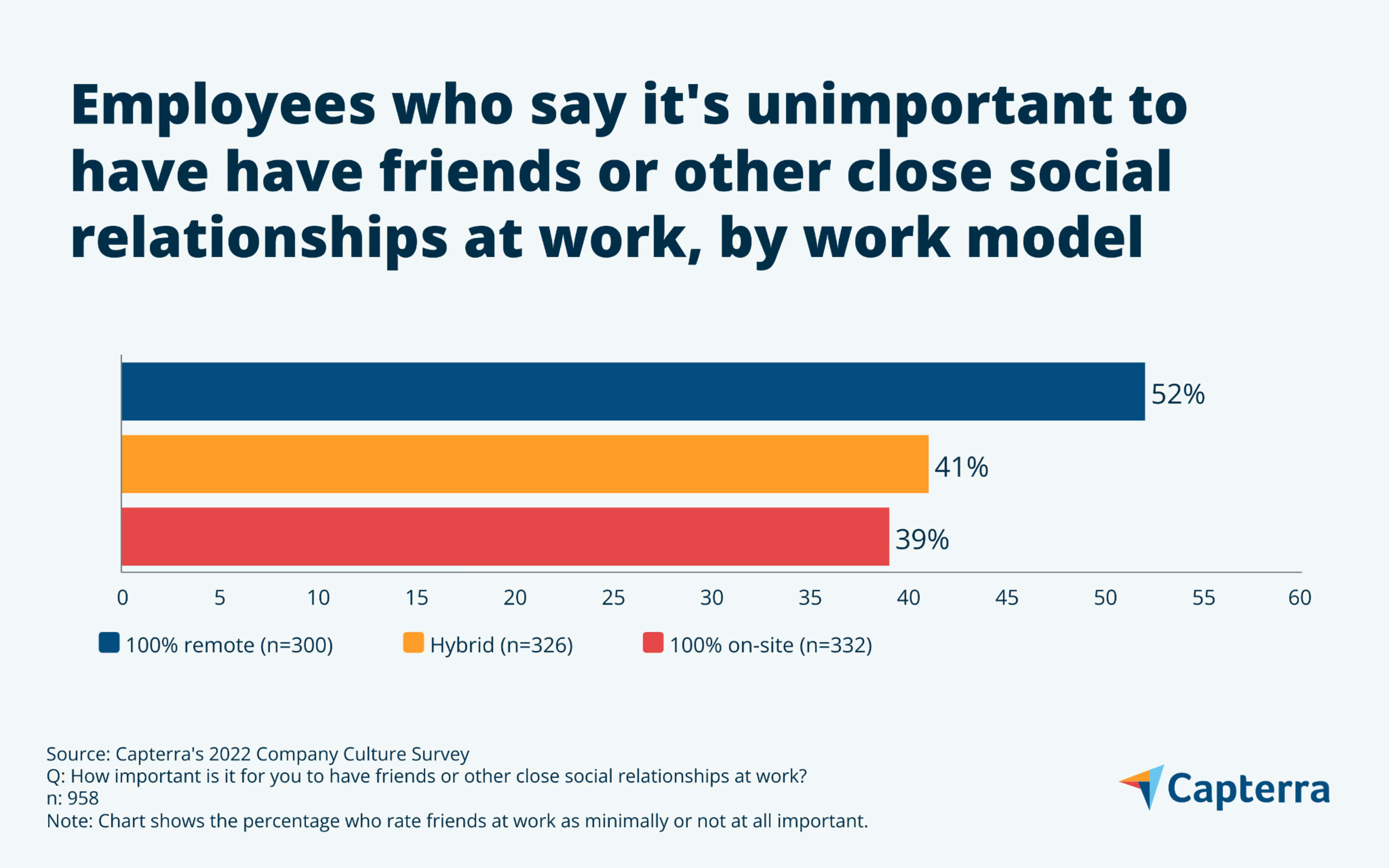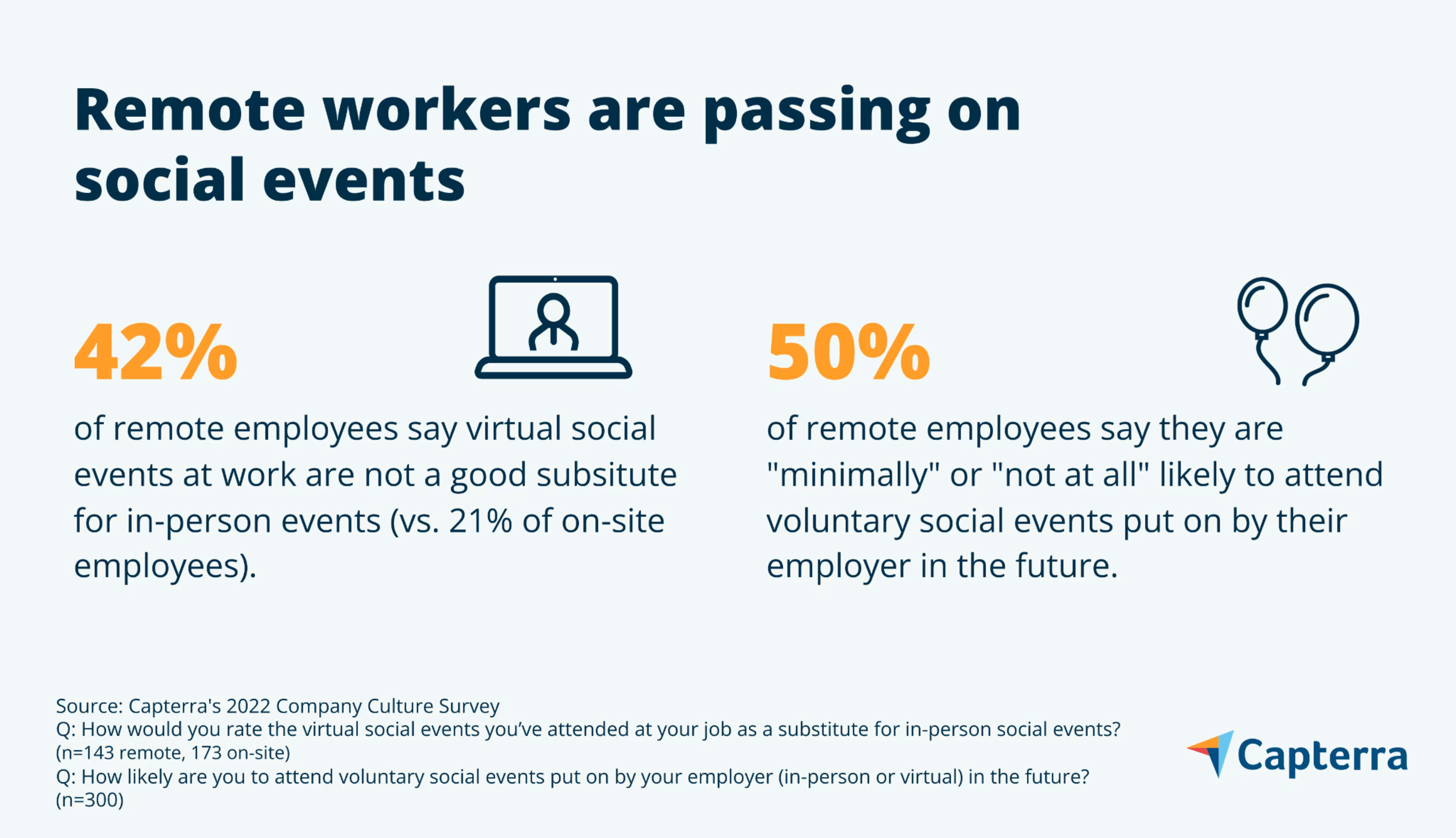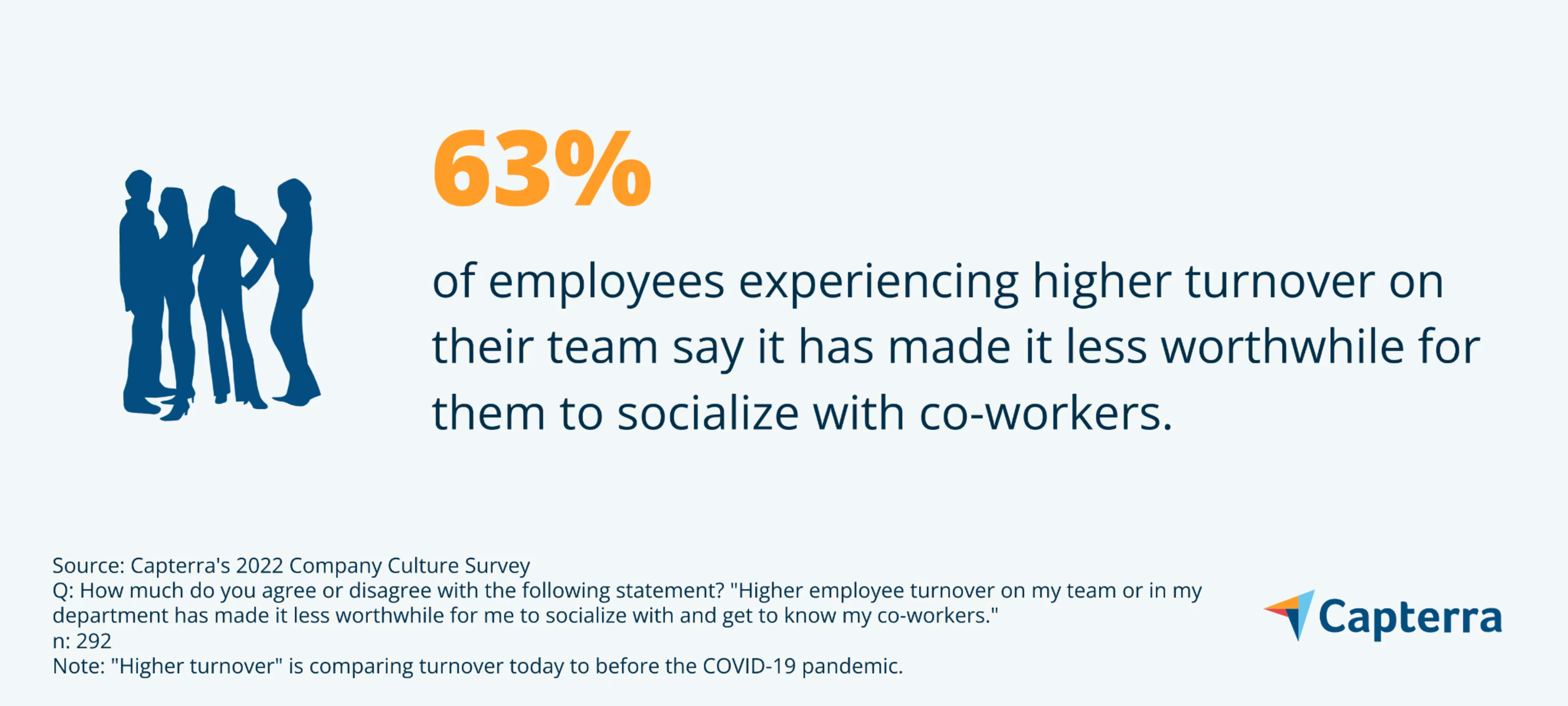Relationships with co-workers are now the least important factor in job satisfaction, according to a new Capterra survey.
This report is the first installment in a series on company culture in the new normal. Come back for part two of our series, publishing soon. In part two, we look at how hybrid and remote work has affected toxic employee behavior.
As HR leaders and people managers struggle to bring increasingly distanced employees together, employees themselves are saying “don’t bother.”
According to Capterra’s 2022 Company Culture Survey (which collected responses from nearly 1,000 U.S. employees), relationships with co-workers are now the least important factor of job satisfaction. We also found that a majority of remote employees aren’t very interested in having work friends at all.
For employers that have relied on social perks like team activities and company parties to build culture and retain top talent, our findings represent a significant talent management shift. In this report, we’ll look at our survey data to explain why the era of the social workplace may be coming to an end, and—more importantly—what executives and HR leaders should do about it moving forward.
Key findings
Only 11% of employees rank relationships with co-workers as a top three factor in job satisfaction—the lowest of 14 factors presented in our survey.
A majority of remote employees (52%) say it's minimally or not at all important to have friends or other close social relationships at work.
63% of employees experiencing above-average turnover on their team agree that higher turnover has made it less worthwhile for them to socialize with and get to know their co-workers.
Co-worker relationships are no longer a top factor in job satisfaction
It wasn’t that long ago that work friendships became an important factor in employee engagement and retention. Emulating tech giants like Google and Facebook—who were racking up “Best Places to Work” awards with their perk-filled playhouse offices—companies in the early 2010s sought to keep employees at offices longer by giving them reasons to hang out with their co-workers.
The strategy paid off: By 2014, full-time employees were spending more time with their workplace pals than their own families, and feeling a deeper connection to their organization because of it.
Things have changed in 2022, to say the least. Entering the third year of a pandemic that has kept co-workers more separated than ever, employees are rethinking the worth of work friends.
When we asked the employees in our survey to rank a list of 14 factors from most important to least important in terms of job satisfaction, only 11% ranked relationships with co-workers in their top three. That tied for the lowest number of any factor in our survey.

Breaking our results down further, we notice a few trends (or lack thereof):
By work model: Employees are just as likely to devalue work relationships whether they work the entire time in a store, office, or other workplace (12%), fully remote (10%), or a mix of the two in a hybrid model (12%).
By gender: Men and women value co-worker relationships about the same (12% vs. 11%).
By age: The youngest Gen Z workers in our sample (ages 18-25) value co-worker relationships the most (16%). By the time employees are 36-45, they value relationships the least (9%). Then, from 46 on, relationships matter a little more again (11%).
By business size: Small-business employees (at companies with 100 or fewer employees) value work relationships the most (15%), while enterprise employees (at companies with 500+ employees) value them the least (9%).
Overall, we find that work friendships are losing their luster. But why? The answer lies in one recent trend and another that’s been going on for decades.
Underwhelmed by virtual events, remote employees are saying goodbye to work friends
What started as a temporary solution to keep employees safe at the onset of the COVID-19 pandemic has become the genie that companies can’t put back in the bottle. The share of online job searches for remote positions has grown over 300% in two years, and our own data finds that a majority of small-business employees (53%) are moderately or extremely likely to consider looking for a new job if they aren’t allowed to work from home at least part of the time moving forward.
In other words, remote work isn’t going anywhere. But there’s a drawback to this shift: Remote employees are the ones who are leading the way in severing their social ties to work.
When asked how important it is for them to have friends or other close social relationships at work, 52% of remote employees told us it’s “minimally” or “not at all” important—the most of any work model.

We found that more than three in four remote employees (77%) have co-workers on their team or in their department who they have never met in-person. Compared to on-site or hybrid employees, remote workers don’t get the benefit of physical face-to-face time with colleagues, causing them to miss out on those serendipitous interactions that build social relationships.
Companies have attempted to encourage more casual interaction through virtual team gatherings, but our findings show that these get-togethers aren’t very effective. Remote workers who’ve attended a virtual social event at work are twice as likely as on-site workers to say they aren’t a good substitute for in-person events, and a majority of remote workers say they are minimally or not at all likely to attend any kind of voluntary social events put on by their employer in the future.
Managers can try, but "Zoom fatigue" has made the prospect of attending a voluntary virtual meeting after a day of mandatory ones increasingly unappealing to remote employees.

With more and more companies moving to hybrid and remote models long-term (a Gartner survey found that 82% of business leaders plan to allow employees to work remotely at least some of the time post-pandemic), work friendships will continue to disappear as remote employees lose interest in them.
Shorter tenures, high turnover are affecting work relationships, too
The mass migration to remote work is a relatively new phenomenon, but there’s another trend impacting work friendships that’s been happening for decades: Employees simply don’t stay with the same employer for very long.
The days of a lifer employee who works at the same company until retirement are long gone. The average work tenure for a U.S. employee, according to the Bureau of Labor Statistics (BLS), has been only around four years since the 1980s. Tenure is likely to shorten even more soon with job-hopping millennials making up a growing percentage of the labor force, and employees quitting their jobs in droves as part of The Great Resignation.
The result of this revolving door approach to employment is that employees are becoming less attached to their peers. Of the employees in our survey who are experiencing higher turnover on their team now compared to before the pandemic, 63% say that it has made it less worthwhile for them to socialize with and get to know their co-workers. For small-business employees (who form more tightknit work groups), this figure jumps to 70%.

To be fair, employees in high turnover industries like retail or food service are used to people coming and going. But with shorter tenures and high turnover bleeding into more stable employment sectors, more and more people will choose to forgo work friendships if those friends won’t be sticking around for very long.
3 reasons why this is actually a good thing for employers
At first glance, this trend is troubling. With less of a social tether to work, are employees going to become disengaged and unproductive? Will retention become an even bigger challenge than it already is?
But the decline of work friendships is actually an opportunity for employers to realign their messaging and strategy with what employees really want in 2022. Here are three reasons why the end of the social workplace is actually a good thing for employers:
1. You can change your tired messaging to job seekers
If you’re still saying your company is “like a family,” job seekers are going to see right through it. Think about it: What family does performance reviews and fires people?
If job seekers don’t want friendships at work, they’re also not looking for a tightknit, family-like culture. Instead of trying to brand your organization as a family—which recent research suggests promotes toxic behaviors—focus your messaging on a shared company mission or the tangible benefits that make your organization a better place to work than your competitors’.
2. You can turn your social event budget into something employees want more
Nearly two-thirds of employees (66%) in our survey say that the budget used by their employer for social events and other efforts to build social connections between employees would be better spent elsewhere in the organization.
Instead of shelling out for a lavish company party that remote workers can’t attend anyway, use that money on things that will actually retain employees. Across the board, our survey found that compensation and work-life balance are significant factors in job satisfaction. Turning your event budget into higher bonuses or more PTO for employees could do wonders.
3. You can focus team gatherings on work issues
Just because employees aren’t looking for friends doesn’t mean they want to avoid working together. Employees still want to know how to better collaborate with their colleagues to do their jobs effectively and ensure toxic workplace issues such as unfairness and discrimination are discussed and dealt with. The rise of employee resource groups (ERGs) is a testament to this.
All that to say, you should still encourage employees to get together. Just have a real work purpose in mind.
